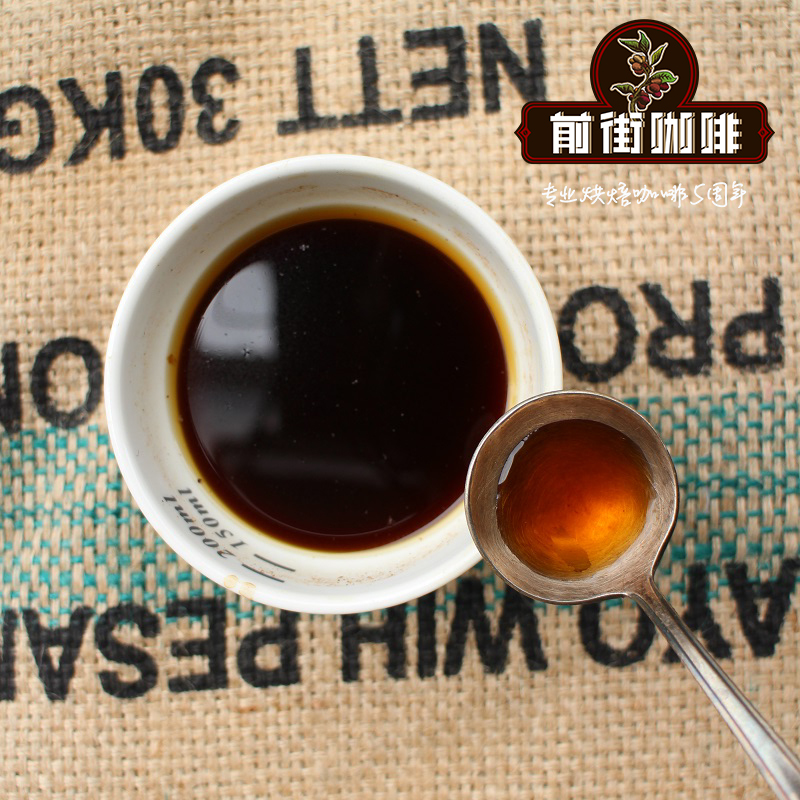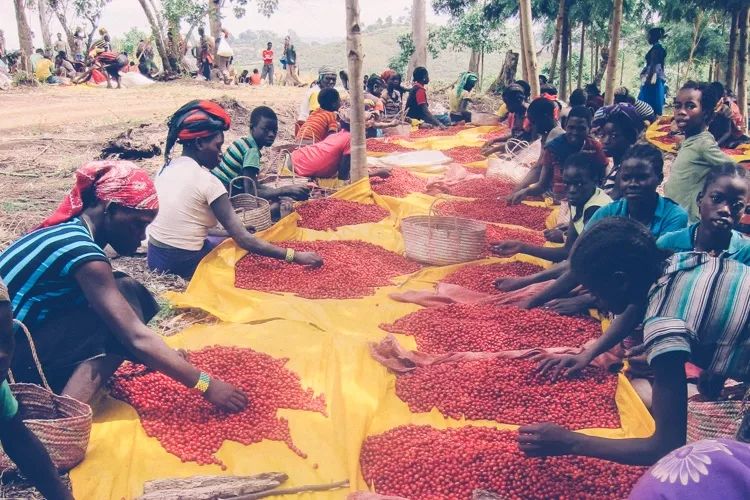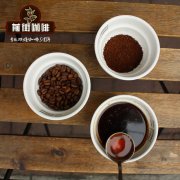Is the coffee good in Guoxia Village? Is there any difference between Rose Xia Village and Rose Summer? The award-winning situation of Guoxia Village Manor

Professional coffee knowledge exchange more coffee bean information please follow the coffee workshop (Wechat official account cafe_style)
Winner of 2017 International bidding for Guoxia Village Manor
Only a few estates in the world can hold their own bids, the most famous of which are Emerald in Panama, Incht in Guatemala, Daterra in Brazil, Mierisch in Nicaragua, and Rosa Village in Ethiopia.
Gesha Village Coffee Estate is completely different from most Ethiopian farms in that it is not a small farm, but a 500-hectare farm with its own washing plant and laboratory, located in the southwest near the border with Sudan, and the most special is that the whole farm only grows Rosa varieties, not Ethiopian native species that generally cannot be determined. Rosa Village divides the farm into eight blocks. The three main Rosa varieties, whose seeds are collected from nearby forests, are not from Panama.
The construction of the farm began in October 2011, and the first harvest in 2015, due to the enthusiastic response, they, with the assistance of Panamanian coffee farmer Willem Boot, offered 21 micro-batches in the first international bid held on May 31, 2017, of which 19 were 120kg and the others were smaller. Bidders from Europe, North America, Asia and Australia responded unexpectedly enthusiastically, and the final bid price was $85 / lb, breaking all previous auction prices for African beans!
Of the 21 micro-batches, 15 were solarization and the rest were washed, coming from a total of 7 microblocks. Canada's Hatch also took part in the bidding and was lucky to be tanned under the bid, from Shewa-Jibabu 's Gori Gesha variety.
Guoxia Village Manor Ethiopia Gesha Village Coffee Estate
Before meeting Willem Boot, Adam Overton had only a vague dream of buying a farm in Ethiopia to grow the world's most delicious coffee Geisha.
Why Ethiopia? Because Ethiopia is said to be the native place of rose summer, the seeds of rose summer were brought out from the depths of the local primeval forest and moved to Panama last century. It was not until early 2000 that it became an amazing coffee. Another thing is that his wife Rachel Samuel is Ethiopian.
Adam has no experience growing coffee. He works as a documentary filmmaker and Rachel is a professional photographer. They were commissioned to shoot coffee documentaries in Ethiopia in 2007. From then on, I fell in love with coffee and wholeheartedly wanted to buy a coffee garden.
They met Willem Boot in 2009, three years after Willem Boot bought La Mula, a Panamanian estate, to grow rose summer. In order to learn from the experience, the couple flew from the Ethiopian capital to Panama and went to Donkey Manor to ask Willem Boot for help. At that time, no one knew that the small estate of La Mula would shine in the "Best Panama" competition in five years' time.
Learning from Willem Boot, the dream of the Adam couple is a major turning point, and they are more determined to build their own Rose Summer Manor. Since they live in Addis Ababa, the capital of Ethiopia, at first they want to find a closer place, it is easier to find labor, the transportation is also convenient. But to meet the conditions for growing rose summer, taking into account altitude, microclimate, all other conditions, unwittingly farther and farther away, and finally came to the most remote southwest of Ethiopia, bordering the border with Sudan.
The area is Bench-Maji, a two-day drive from Adis Addis, and there are several nearby villages called Rose Summer, which is also the legendary most likely place of origin. Bench-Maji was independent and rarely entered by outsiders, and the situation did not improve slightly until the road was opened up a few years ago. The local Meanit aborigines have their own language. To all outsiders, they call it China!
The Adam couple, accompanied by the locals, climbed to the mountains. As soon as they saw the place, they immediately fell in love with the land-1900 to 2100 meters above sea level, abundant rainfall, suitable temperature patterns, rich undeveloped primeval forest soil, exposure to the long-standing coffee growth ecology, with ancient coffee trees. After three years of searching, I finally have a foothold in this dream land. They chose a simple name: "Rose Summer Village Coffee Manor" (Gesha Village Coffee Estate).
When the farm broke ground in October 2011, Willem Boot, their consultant, flew to the manor and saw more like a camping prairie than a thriving farm. In order to guard against incoming lions, watchtowers were built on the farm to sound the alarm early. To explore the forest, you need to be equipped with AK 47 rifles, guard against ferocious wild animals, and be accompanied by aborigines with spears.
But at about the same time, there was a breakthrough in finding suitable varieties for planting. Willem Boot and Adam found in a primeval forest not far from the manor that the shape of the wild rose summer was very similar to that of Panamanian rose. regardless of the growth shape of cherries and branches, the growth of shade trees was deeply concealed, thousands of coffee shrubs were in full bloom, and the air was filled with unbelievably strong jasmine fragrance. Willem Boot recalls that he was "in heaven" at that time!
The forest they found is called Gori Gesha Wild Coffee Forest, just 20 kilometers from the manor, and Adam believes it is the same source collected by the famous Panamanian summer of 1930. Willem Boot also believes that these trees are very similar to the rose beans he planted in La Mula, which have green and brass tips. In February 2012, Willem Boot returned to the manor, and the Rosa variety of the manor was finally finalized.
In 2015, when the estate of Rosa Village in Ethiopia was harvested for the first time, with unease, they took the first batch of processed raw beans and sent them to the Willem Boot Cup for testing. The result of the cup test turned out to be the best cup Willem Boot has tried all year!
Important Notice :
前街咖啡 FrontStreet Coffee has moved to new addredd:
FrontStreet Coffee Address: 315,Donghua East Road,GuangZhou
Tel:020 38364473
- Prev

Rose Summer from hometown | Solar treatment of Ethiopian Rosa primordial species in Rosa Village Manor
Professional coffee knowledge exchange more coffee bean information please follow the coffee workshop (Wechat official account cafe_style) steaming Ethiopia Gesha Village Gesha Gori Natural Rose Village, Ethiopia Rose Summer Native species Solar 01 | production area profile in recent years, people have begun to pay attention to the start of Gesha production in Ethiopia's aboriginal areas.
- Next

How is the acidity of rosy summer coffee in Yega Sheffield Village? Who is the best Rose Summer Manor?
More information about coffee beans Please follow the coffee workshop (official Wechat account cafe_style) before meeting La Mula owner Willem Boot in Panama, Adam Overton had only a vague dream of buying a farm in Ethiopia to grow the world's most delicious coffee Geisha. Why Ethiopia?
Related
- Does Rose Summer choose Blue, Green or Red? Detailed explanation of Rose Summer Coffee plots and Classification in Panamanian Jade Manor
- What is the difference between the origin, producing area, processing plant, cooperative and manor of coffee beans?
- How fine does the espresso powder fit? how to grind the espresso?
- Sca coffee roasting degree color card coffee roasting degree 8 roasting color values what do you mean?
- The practice of lattes: how to make lattes at home
- Introduction to Indonesian Fine Coffee beans-- Java Coffee producing area of Indonesian Arabica Coffee
- How much will the flavor of light and medium roasted rose summer be expressed? What baking level is rose summer suitable for?
- Introduction to the characteristics of washing, sun-drying or wet-planing coffee commonly used in Mantenin, Indonesia
- Price characteristics of Arabica Coffee Bean Starbucks introduction to Manning Coffee Bean Taste producing area Variety Manor
- What is the authentic Yega flavor? What are the flavor characteristics of the really excellent Yejasuffi coffee beans?

